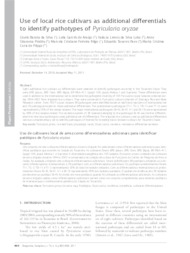Use of local rice cultivars as additional differentials to identify pathotypes of Pyricularia oryzae.
Use of local rice cultivars as additional differentials to identify pathotypes of Pyricularia oryzae.
Author(s): SILVA, G. B. da; ARAÚJO, L. G. de; LOBO, V. L. da S.; PRABHU, A. S.; RÊGO, M. C. F.; PAES, E. T.; FILIPPI, M. C. C. de
Summary: Eight additional rice cultivars as differentials were selected to identify pathotypes occurring in the Tocantins State. They were BRS Jaburu, BRS Taim, BRS Biguá, BR IRGA-417, Epagri 109, Javaé, Metica-1 and Supremo. These differentials were used in addition to the international set to determine the pathogenic diversity of 193 Pyricularia oryzae isolates collected during 1994-2002 from irrigated rice cultivars. They were conserved in Pyricularia culture collection of Embrapa Rice and Bean Research center. From 193 P. oryzae isolates 38 pathotypes were identified based on leaf blast reactions of international set and 29 pathotypes based on these additional differentials. The predominant pathotypes (TI-1, TG-2, TD-15 and TF-2) were represented by 53% of the tested isolates. The major international pathotypes (IB-45, IB-41, II-1 and ID-13) were represented by 43% of the isolates tested. The virulence pattern of 28 isolates belonging to the pathotype IB-45 was further differentiated into nine local pathotypes using additional set of differentials. The irrigated rice cultivars used as additional differentials serve as complementary set to identify pathotypes of interest for breeding blast resistant cultivars for Tocantins State.
Publication year: 2011
Types of publication: Journal article
Unit: Embrapa Rice & Beans
Keywords: Arroz, Brusone, Doença de planta, Oryza sativa, Pyricularia oryzae, Raça fisiológica
Observation
Some of Embrapa's publications are published as ePub files. To read them, use or download one of the following free software options to your computer or mobile device. Android: Google Play Books; IOS: iBooks; Windows and Linux: Calibre.
Access other publications
Access the Agricultural Research Database (BDPA) to consult Embrapa's full library collection and records.
Visit Embrapa Bookstore to purchase books and other publications sold by Embrapa.

